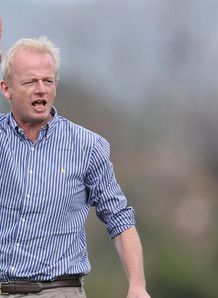
Trying to make a point: Saracens' CEO, Ed Griffiths
Welcome to Loose Pass, our weekly dishing up of mince pies, Christmas puddings and festive roasts.
This week we will mostly be concerning ourselves with spending limits, wise words from evergreens and an upgrade in rugby TV...
It seems immaculate timing that within 48 hours of their CEO virtually demanding that the Premiership salary cap be abolished, Saracens should find themselves apparently at the middle of an investigation into whether they may have breached it. The timing of wing Jack Wilson's in-season transfer to the Sharks was just as appropriate, two days after the salary cap probe news broke.
Bath are supposedly also under the microscope, although they are keeping significantly more schtum about the whole affair.
Yet they seem a little more confident of beating the probe, having signed on another player since the inquiry was announced and also reminding us after their impressive destruction of Gloucester that they remain decidedly pro-cap and pro-competitive integrity.
However, you'd also be naive not to infer something into Bath's sudden decision to let Will Genia go to France next season rather than the West of England.
Anyway, back to Saracens, more specifically back to Sarries' CEO Ed Griffiths, who's arguments against the salary cap run thus:
1) If the salary cap is left to forbid the required investment, it will kill any hope of growth.
2) Imagine the likes of Arsenal or Manchester City being asked to compete with Barcelona, Bayern (Munich) and Real Madrid under those circumstances. It would never happen, but it happens in rugby.
3) It is time ... to ensure a level playing field in Europe, to build the strongest league in world rugby and to let players earn market-related salaries. We must release the handbrake and step on the accelerator.
4) We understand some clubs fear the removal of the salary cap will cause wage inflation, yet, in reality, salaries are already being driven by the French clubs.
I'm not really sure what he is trying to get at, except lamenting his inability to spend more, and fast.
Growth in England is emerging fast in the shape of many a good player from the academies (Sarries included), the absence of which concept the French national mentors have been lamenting hard for a couple of years now, while some Ireland fans are a touch disquieted with the number of thoroughly non-Irish players popping up in emerald green.
Soccer is not yet subject to a cross-border cap, but it is subject to financial fair play rules which mean the clubs do now have to raise the money they spend rather than just crank up the gearing to dangerous levels.
The concept is slowly making its mark. The reason for it? Clubs - such as Chelsea - being backed fleetingly by an impossibly rich person who decides to go elsewhere when all does not run his way and leaves the club in peril.
The Premiership is - I would say - the strongest league at the moment. France has Clermont and Toulon who are sweeping all, and Toulouse remain France's traditional flagship side but the English record this season has been significantly better than the French overall in Europe.
The Top 14 frequently throws together a plethora of big names in both colour jerseys on the pitch, but the rugby is frequently inferior - I am yet to see a French game this season as good as Saints-Tigers this past weekend.
And whatever is put out on the field, the ridiculousness and frequent less-than-best practice off it (witness the recent Montpellier soap opera, and Dan Leo's assertion that his move to London Irish ensured him a better shot at the next World Cup than being in the bumbling French club environment did, respectively).
As for the final point in Griffiths' offensive... that at least has substance. But it is worth remembering that for years, the French had a 'league of two speeds', virtually owned by about four teams who would always win if needed, while the rest were left to celebrate hollow victories against those four's second strings on occasion.
More than one club in France has been driven to ruin trying to keep up with the Martins. Many others now find themselves saddled with vast squads of journeymen - many of those journeymen signed because the good domestic players come at such a premium that it's simply a case of balancing the books.
The two speeds have moved closer together, but looking at the spending from Toulon and Racing Métro already ahead of next season, it just seems to create an unsustainable upward market spiral for all but a very fortunate few.
All is not well in France. Much is well in England. Griffiths' tirade about not being able to spend like them is not respective to this fact - it seems to me as though the fact it might be most respective to is that Saracens do have pots of money yet can neither spend it, nor win a competition run with the good integrity a salary cap bestows upon it.
It's easy to outspend others and dominate everything - is anybody else bored of Toulon? It's a lot harder to dominate on a regulated playing field, a hardness of breeding which will serve England well in the future. The salary cap must stay.
Still, all is not as it could be in England apparently. The negative aspect to all this level field competitiveness remains the perception that English teams in the Premiership frequently play rather not to lose than to win, that the coaches are merciless dictators clamping down on any form of improvisation or other deviation from the game-plan, that England's average club player is a 6'3" 110kg gym bear programmed to catch, bludgeon and ruck.
Nick Easter and Andy Goode were both talked to this week about the all-pervading conditioning culture in England's academies, coupled with the dwindling sub-first team opportunities for those not in form or in the good books and thus the dwindling chances to develop the rugby instincts and just play.
Conditioning is conditioning. It's necessary for the modern game, but that lack of sub-first team rugby was by far the most worrying aspect of English club rugby.
There used to be a U21 league and a second team league (the A-league it was known as). That second team league now comprises a dreadful six regular season games. So what do those guys outside the firsts do?
Assuming a squad of 40, you'd have 23 in the matchday squad, of whom only 17 - bar mishaps, would see more than 30 minutes' action. Maybe factor in ten on the injury list on average. That's maybe 13 players whose week's work culminates in less than 30 minutes of rugby in a week. No wonder they're always hitting the gym - they've got to get the built-up energy out somewhere.
Some are lucky enough to go out on loan, but some have wages that are too unaffordable for that - not to mention the fact that they look out of match practice...
"That's what I find hard these days looking at the academy kids, I don't think they play enough rugby," Goode said to the Telegraph.
"That's where you develop your skills under pressure, which you can't in training. Obviously there's a place for learning in the computer rooms and doing your analysis, but you play rugby to play rugby."
Cripes yes. You head down to New Zealand or South Africa and you'll see a shorter, more intense season, one aimed at making sure all protagonists get as much rugby in as possible and where the best are given a logical pathway up to the next level because competitions don't overlap.
And good grief, if you are not making the first team, how the hell are you meant to prove yourself if you can't destroy the opposition's seconds on a weekly basis? You get that chance down under too.
If Ed Griffiths has money to spend, maybe he can bankroll a thriving A league and make sure that England's professional players actually get to play. It doesn't even need to be salary capped.
I - and my predecessor - were both pretty acidic on BT Sport's hi-jacking of rugby from Sky, but I will relent and say that they really have made their weekly rugby digest magazine, 'Rugby Tonight' a must-watch.
While Sky's lot continue to adopt a more aloof and downward-looking attitude to the fans, BT have brought in a fantastic living-room banter style to their presentation, while the content aims - and succeeds - in educating without patronising to all those who would like to increase their basic knowledge.
In terms of doing that, it even gains - to my mind - the extraordinary accolade of being even better than Re:union in New Zealand. If you can and haven't already, give it a squizz. It's Monday night at 8pm. And Tony Johnson and co: the ball's in your court!
Loose Pass compiled by former Planet Rugby Editor Danny Stephens










Share: